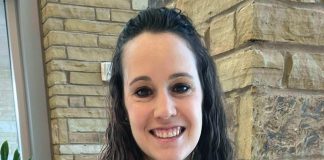Oklahoma City man drops 90 pounds and credits OU Medicine team with saving his life
Oklahoma City – When Jerry Trent looked in the mirror, it wasn’t just the excess weight he saw. It was his own mortality. The Oklahoma City man knew his life was in danger.
“It’s a choice. Do you want to live or not? And I wanted to live and not be sick all the time,” Trent said.
Trent’s doctors told him he was more than just overweight. He was morbidly obese. Trent, 71, also had diabetes and both were taking a toll on his body. His joints ached. He had trouble breathing and his blood sugar was high – dangerously high.
“I had lost some weight along the way here and there, but it wasn’t enough,” he said.
His doctor had him on two different kinds of insulin (5 shots a day), metformin and another diabetes medication to try to reign in his soaring blood sugar levels, but the numbers were still alarmingly high.
“Everybody has gone on diets to lose weight. I didn’t go on a diet this time because you will go off a diet,” he explained.
Instead, Trent turned to the Metabolic and Bariatric Surgery Program at OU Medicine. He attended a seminar first.
“I was like, ‘Let’s do it tomorrow,’” he said.
However, Laura Fischer, M.D., and her team know that bariatric surgery success starts long before the patient arrives in the operating room.
“We know that bariatric surgery is a powerful and important tool to help people like Mr. Trent lose weight successfully, but it is only part of the equation. Our clinic combines experts with a variety of medical backgrounds to provide comprehensive care and education. In fact, all our patients are required to meet with our team for in-depth medical, nutritional, psychological, and physical therapy evaluations. The goal is to develop an individualized treatment plan that helps each patient safely and effectively progress toward surgery,” Fischer said.
Before surgery is scheduled, the OU Medicine Metabolic and Bariatric Surgery Program works to help each patient complete the necessary testing and education required to complete the program, including:
* Attending a free Bariatric Surgery Information Seminar
* Working with the weight loss team on diet and exercise changes
* And undergoing a comprehensive medical evaluation
“You do go through some hoops before you get to surgery,” Trent said, but he willingly went through all of them and goals that would need to be met for surgery were set. Trent needed to lose 10 to 15 percent of his body weight. He lost the weight, but there was another hurdle that he still needed to overcome.
“She said my A1C was going to have to be below 8 before she could even begin to do surgery,” he said.
The A1C test is a blood test commonly used to diagnose and then to gauge how well a person is managing his or her diabetes. Trent’s A1C was over 12. It took three months, but finally Trent was there. His A1C hit 7.9 and surgery was scheduled.
Trent underwent a procedure known as Roux-en-Y Gastric Bypass surgery.
“It’s really a two-part procedure in which we first surgically reduce the size of the stomach. With a small stomach, the patient feels full quickly and therefore eats less,” Fischer explained.
“Next, we disconnect the new, smaller stomach pouch from the rest of the stomach and the duodenum (the first part of the small intestine) and connect it to a part of the small intestine farther down, called the jejunum. This reduces the absorption of calories and nutrients.”
Fischer utilizes laparoscopic techniques with small incisions to lessen pain, speed healing and reduce the risk of infection.
Trent called the surgery “a piece of cake” and the results “amazing.” He has dropped almost a third of his body weight.
“I’ve lost 90 pounds. So you can imagine how much better I feel. I am so proud of myself. I was wearing size 50 pants and I have a pair of size 38 that I can get into now,” he said.
Perhaps even more importantly, Trent has finally been able to control his blood sugar levels.
“Since surgery, I have not had to have one shot or one pill of insulin. It saved my life. They are my heroes,” Trent exclaimed, beaming at his success and newfound health.
Trent’s medical team beams with pride too at his success.
“I love my work,” Fischer said. “It is so rewarding to be able to help people reclaim their health and their lives. Bariatric surgery is not for everyone, but for patients like Mr. Trent, it is often the tool that finally allows them to reach their health and weight goals.”
Most insurance covers the procedure and the program has financial specialists in place to assist patients too.
Trent is now walking a little over a mile a day and he’s purchased a new workout machine.
“I’ve been working out and, oh my goodness, it’s made me stronger than I have been in years.”
To learn more about the OU Medicine Metabolic and Bariatric Surgery Program, visit www.oumedicine.com or call (405) 271-9448.











